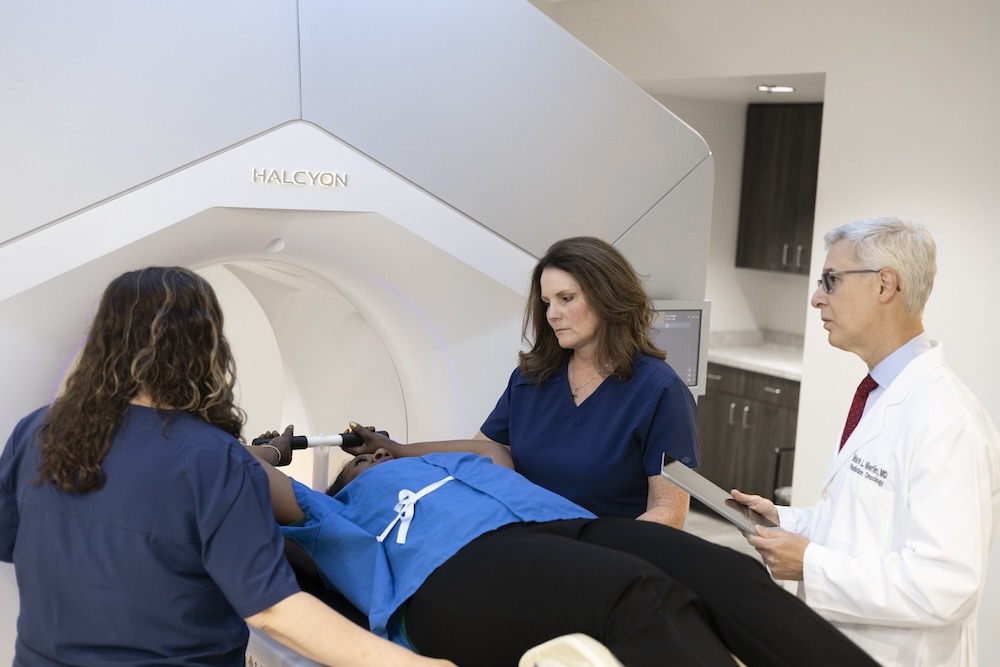
The stage of colon cancer plays a vital role in the recommended treatment plan for each patient. Determining the stage helps your oncologist understand where the cancer is located and how far it has spread through the colon or to other areas of the body. This information and biomarker test results will assist your cancer care team in determining which treatments will likely provide the best results.
How Do Doctors Diagnose Colon Cancer?
A colon cancer diagnosis usually occurs in one of two different ways.
- Cancer screening - The most effective way to detect colon cancer is through a screening colonoscopy. During a colonoscopy, your doctor will look for polyps and remove any that look cancerous. A pathologist will then review these to determine if there are abnormal cells. If cancer is found and you are not experiencing any symptoms, the cancer is likely early-stage.
- Symptoms appear - Colon cancer grows for a while before displaying any symptoms, which means that by the time symptoms appear, the cancer may have already progressed to an advanced stage.
The Staging Process for Colon Cancer
If you have been diagnosed with colon cancer, your doctor will need to determine the extent of the disease. This is called the stage. Usually, a medical oncologist leads the colon cancer treatment team and is the doctor who determines the stage. They will review many different pieces of information to finalize the stage, including:
- The pathology report from the tissue removed during a biopsy or surgery
- The size of the tumor and where it’s located
- Any lymph node biopsy results, if available
- Images taken and any other tests used to see if cancer has developed outside of the colon
The Staging System for Colon Cancer
The TNM staging system, created by the American Joint Committee on Cancer (AJCC), is the most widely used. It evaluates the tumor size, spread of the tumor, lymph node involvement, and whether it has metastasized or grown in other areas of the body beyond the original site. The TNM system will provide a stage that includes information for each of these:
- T: the size of the tumor and any spread of cancer into nearby tissue
- N: the spread of cancer to nearby lymph nodes
- M: metastasis (spread of cancer to other parts of the body)
After establishing the T, N, and M values, your oncologist will assemble the results to assign an overall cancer stage. Stages are represented by Roman numerals 0 to IV (4). Other letters may accompany the stage numbers to indicate slight differences within that stage.
Generally, the lower the number, the less advanced the cancer. Lower stages of colon cancer typically have better outcomes than those at higher stages.
Colon Cancer Stages
The stage of colon cancer impacts:
- The recommended treatments and their order
- Your prognosis or likelihood of survival
- Your ability to participate in a clinical trial
Talk to your oncologist about the stage when they determine it and what it means for your treatment plan. The following is a general outline of the stages of colon cancer.
- Stage 0 means the cancer is found only in the innermost lining of the colon.
- Stage I indicates that cancer has grown into deeper layers of the colon but has not spread to lymph nodes.
- Stage IIA means the cancer has grown through the wall of the colon but has not spread to nearby tissue or nearby lymph nodes.
- Stage IIB cancer has grown through the layers of the colon muscle to the lining of the abdomen but not into nearby tissues or lymph nodes.
- Stage IIC means the tumor has spread through the wall of the colon and has grown into nearby tissue, lymph vessels, or blood vessels but has not yet affected lymph nodes.
- Stage IIIA indicates the cancer has grown through the inner lining or into the muscle layers of the intestine and is affecting one to three lymph nodes.
- Stage IIIB cancer has grown through the bowel wall or to surrounding organs and into more lymph nodes, but not to organs that are further away. It could be affecting four to six lymph nodes or more.
- Stage IIIC cancer has spread to seven or more lymph nodes but not to other organs.
- Stage IVA cancer has spread to a single distant part of the body, such as the liver or lungs.
- Stage IVB cancer is similar to IVA, but it has spread to more than one part of the body.
- Stage IVC cancer has also spread to the peritoneum and possibly to other organs.
Colon Cancer Treatment Options by Stage
Surgery is typically the first treatment for stages I and II. Patients whose colon cancer is more advanced may also have surgery. However, because the cancer has developed further into the colon and lymph nodes by stages III and IV, patients are more likely to receive additional treatments, such as chemotherapy, targeted therapy, immunotherapy, and radiation therapy.
Stage 0 and Stage I colon cancer typically only require surgery. The doctor performing the colonoscopy will remove the cancerous polyps. Another surgical procedure used to treat early-stage colon cancer is a partial colectomy, to remove a portion of the colon where the tumor has grown.
Stage II colon cancer is also first treated with surgery most of the time. Chemotherapy may be needed depending on how deep the cancer cells grew into the colon wall.
Stage III colon cancer usually requires a partial colectomy and the removal of nearby lymph nodes in addition to chemotherapy. Patients whose cancer cannot be removed entirely, or those who are not healthy enough to undergo surgery, may receive radiation therapy in addition to chemotherapy.
Stage IV colon cancer treatment varies and may include surgery, chemotherapy, targeted therapy, immunotherapy, radiation therapy, or a combination of these treatments. The specific set of treatments varies based on where the cancer has developed outside of the colon.
Radiation therapy is typically used to relieve colon cancer symptoms, such as pain, to reduce the size of the tumor, or to treat advanced colon cancer that has spread to distant organs.
Learn more about the difference between early stage and late stage colorectal cancer treatments.
External Beam Radiation Therapy for Colon Cancer
External beam radiation therapy is the most common type of radiation therapy for colon cancer. It uses high-intensity radiation beams delivered from a linear accelerator outside the body. It can precisely target the tumor’s specific size and shape, whether in the colon or other areas of the body.
The radiation oncologist, who works closely with your medical oncologist, will review your images and take additional images to develop a personalized treatment plan. A planning session is performed so you can be placed in the exact same spot each time during treatment. This reduces the amount of radiation given to other areas of the body. You will be re-checked frequently to be sure nothing has moved or changed.
Radiation treatments can last 2-8 weeks, five days a week, depending on the treatment goals and the patient's response.
Personalized Colon Cancer Treatment in the Atlanta Area
If your colon cancer treatment plan includes radiation therapy, you can choose where you receive treatment. Because radiation therapy is usually given five days a week for several weeks, finding a treatment center near your home or office is a good idea.
We are located throughout the Atlanta area, including Conyers, Covington, Decatur, and Snellville, Georgia. Request an appointment at the location nearest you for an initial consultation. We are also available to provide second opinions to discuss the best radiation treatment plan for you.


